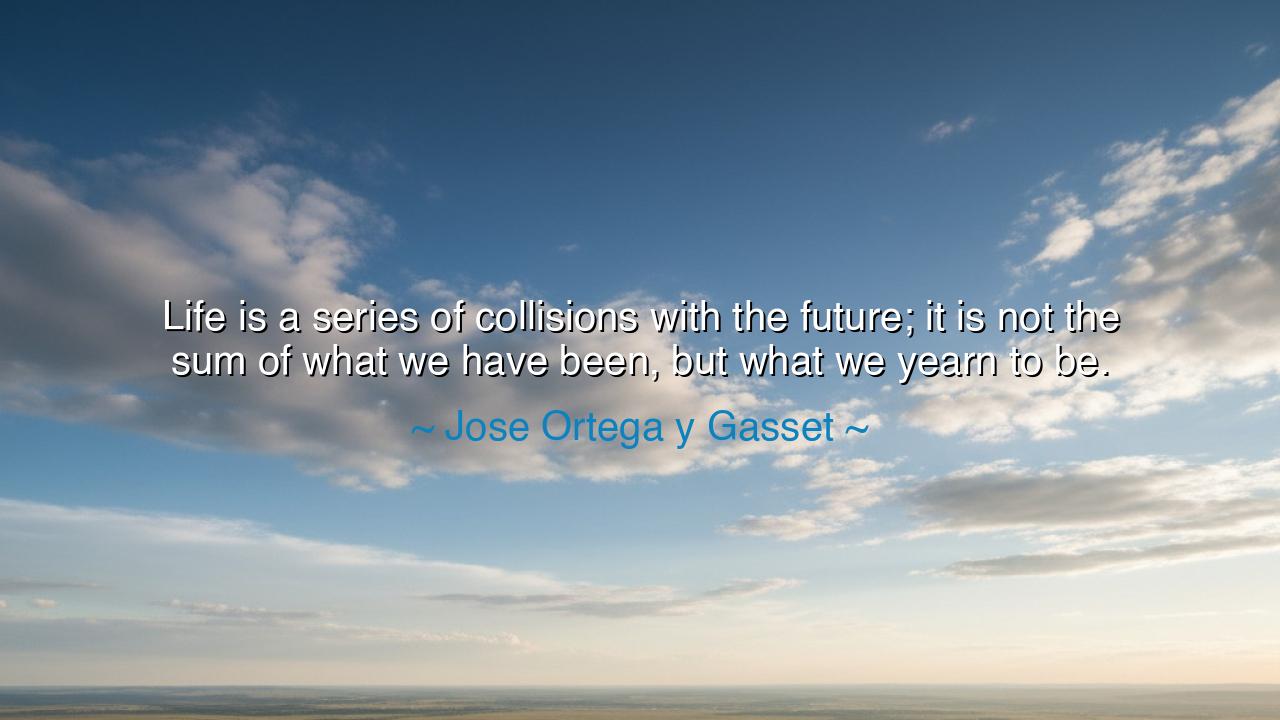
Life is a series of collisions with the future; it is not the sum
Life is a series of collisions with the future; it is not the sum of what we have been, but what we yearn to be.






Life, as the great philosopher Jose Ortega y Gasset teaches us, is not merely a collection of past events and actions. It is a series of collisions with the future, a dynamic and ever-moving force that propels us forward. We are not defined by what we have been, but by what we yearn to be. These collisions—those moments when the present meets the unknown—shape us, mold us, and define our journey. Each interaction with the future is a chance to change, to grow, and to become something greater than we were yesterday. Life, in its deepest sense, is not about looking backward to what has passed, but about yearning for what lies ahead, and allowing that yearning to transform our very essence.
In the time of the ancient Greeks, the philosopher Heraclitus spoke of the unceasing flow of life, of change, and of becoming. "You cannot step into the same river twice," he said, for the waters are always changing, always moving. Heraclitus understood that life is not static; it is a constant collision between the present and the future. Just as the river’s waters are never the same, so too are we never the same from one moment to the next. Our lives are shaped by our encounters with what is to come, by the choices we make in the face of uncertainty, and by the dreams we chase, no matter how distant they may seem.
Consider the journey of Alexander the Great, who, even as a young king, constantly collided with the future. His ambition was not for what was, but for what could be. Alexander did not rest on the laurels of his inheritance or the past glories of his kingdom. Instead, he yearned for world conquest, for a legacy that would stretch beyond his lifetime. His encounters with the future were not gentle or passive; they were battles, each one testing his resolve, his leadership, and his vision. Alexander’s life was a series of collisions with destiny, each one propelling him toward a future greater than the sum of his past. His desire to conquer the known world, to push beyond the limits of what had been, was the driving force of his greatness.
Mahatma Gandhi, too, embodied this collision with the future. In the face of an oppressive empire, he could have been consumed by the weight of history, by the centuries of subjugation and injustice. Yet, Gandhi did not allow the past to define him. He yearned for a free India, for a future where justice and equality reigned. His life was not a reflection of what India had been, but of what it could become. He faced the future with an unyielding determination, using non-violence as his weapon to transform not just his country, but the very way the world approached the fight for freedom. Gandhi’s vision of the future, his yearning for a better tomorrow, was far more powerful than the struggles of the past.
This, then, is the core of Ortega y Gasset’s wisdom: the past does not bind us. The sum of our lives is not measured by our failures, our losses, or even our achievements. It is defined by our yearning, by the desires we carry forward, and the actions we take to bring those desires to life. In the pursuit of our future selves, we encounter both joy and hardship, but it is through these collisions that we are forged. Life is not about avoiding conflict or shying away from the unknown; it is about facing these moments with courage and conviction, knowing that every challenge is an opportunity to move closer to who we are meant to be.
Consider the words of Steve Jobs, who, despite facing tremendous setbacks in his career, refused to be bound by the past. He looked forward, always yearning for what could be, for what technology could become. His belief in innovation and creativity fueled his journey, and through each failure, he collided with a future he envisioned. Jobs’s life teaches us that it is our vision for the future, not our past, that determines our true potential. His legacy is not just in the devices he created, but in the way he reshaped the future of technology itself.
The lesson here is clear. If we are to live with purpose and meaning, we must embrace the idea that life is a series of collisions with the future. We must not be prisoners of what we have been but boldly reach for what we yearn to become. The past may shape us, but it is our vision of the future that defines us. To follow this path, we must constantly look ahead, not with fear, but with anticipation and hope. We must cultivate our dreams, for they are the compass that will guide us through the uncertainties of life. And in the face of adversity, we must remember that each collision with the future brings us closer to the person we are meant to be. Let us move forward with courage, knowing that our destiny lies in the dreams we dare to chase.






AAdministratorAdministrator
Welcome, honored guests. Please leave a comment, we will respond soon